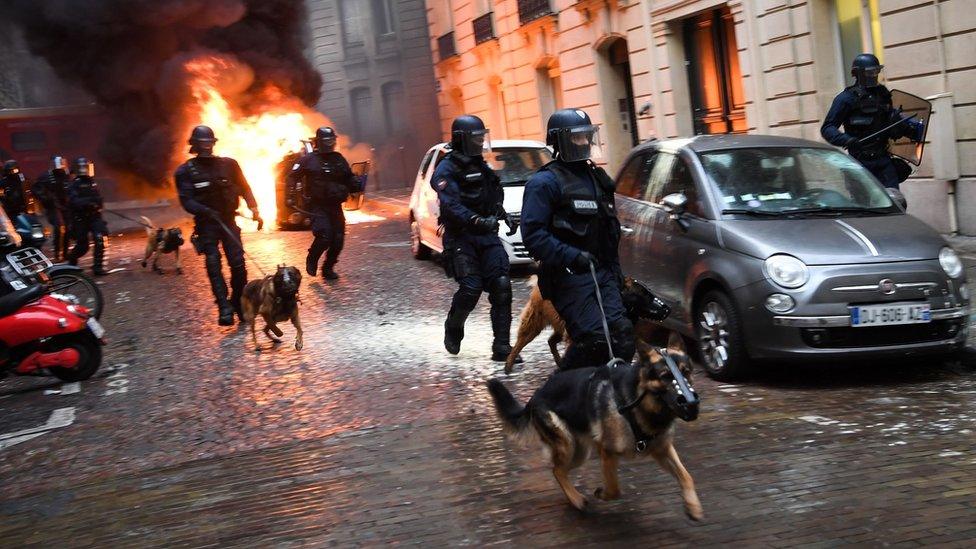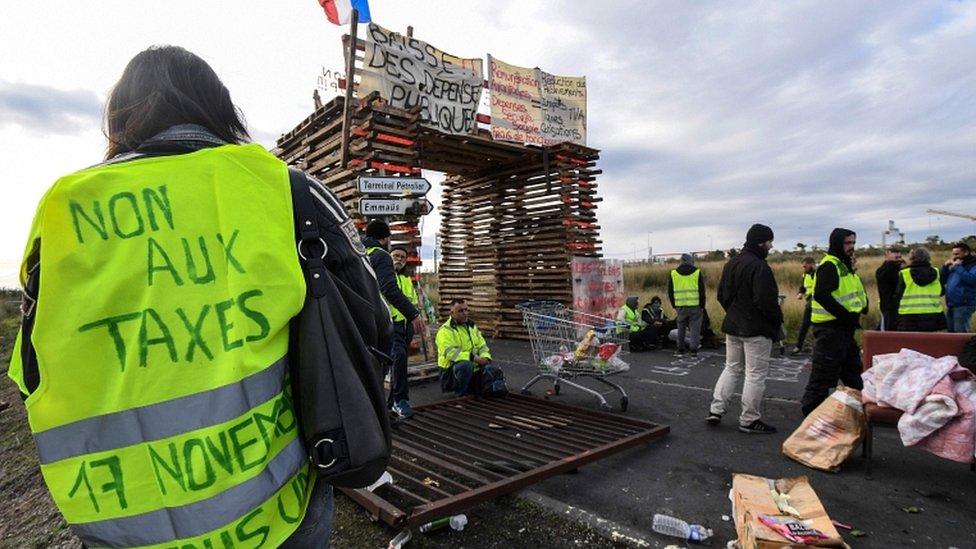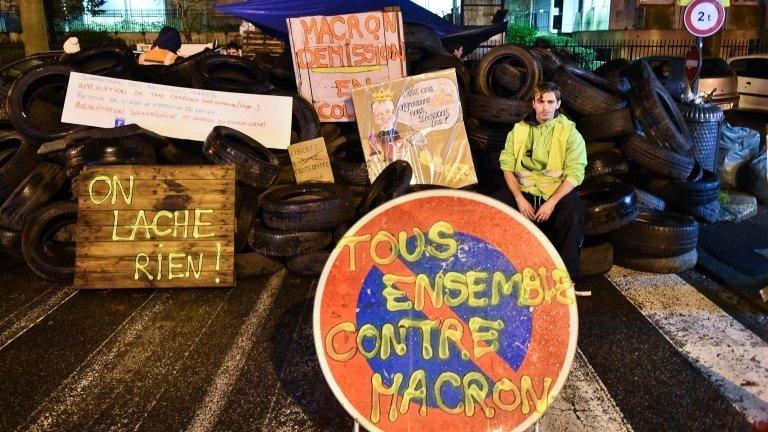Yellow vest protest in Paris sees police detain hundreds
- Published
Protesters surged forward before tear gas was fired
Police in Paris have fired rubber bullets and tear gas as a fourth weekend of anti-government protests across France turned violent.
Almost 1,000 people have been taken into custody nationwide.
Parisian hospital authorities said 126 people had been injured in the city, but none seriously. At least three police officers were also hurt.
The "yellow vest" movement opposed fuel tax rises but ministers say it has been hijacked by "ultra-violent" protesters.
An estimated 125,000 demonstrators gathered across the country during the day, with 10,000 of them in the capital, where the scenes were the most destructive.
Looters have been seen smashing shop fronts, and cars have been set on fire.
In a television address on Saturday evening, Prime Minister Edouard Philippe said the "casseurs" (troublemakers) were still at work.
He called for more communication between the government and protesters to resolve the conflict. "The dialogue has begun," he said. "It is now necessary to rebuild the national unity."
What is happening this weekend?
Apart from Paris, there were demonstrations in several other cities on Saturday including Lyon, Bordeaux, Toulouse, Marseille and Grenoble.
Some places also had separate climate change marches taking place.
There have been a number of confrontations in the capital.
Video footage showed one demonstrator being hit in the torso with a rubber bullet while standing in front of a line of police with his hands up. At least three members of the press were also hit.
Water cannon were deployed on a street east of the city centre.
As night fell, protesters converged on Place de la République, and a heavy police presence remained on the Champs-Elysées.
Nearly 90,000 officers were deployed countrywide in anticipation of clashes, including 8,000 in Paris where 12 armoured vehicles were also utilised.
Last week, hundreds of people were arrested and 162 were injured in violence in Paris - some of the worst street clashes in the French capital for decades.
This weekend, six matches in the top tier of France's football league were postponed. The Louvre, Musée d'Orsay and other sites were also closed all day in Paris.


What next for Macron?
By Hugh Schofield, BBC News, Paris
The French government is relieved that its worst forebodings about the protests did not come to pass.
There was certainly some violence in Paris, but it was not on the scale of the week before.
The new tactics of the police - record numbers of officers deployed, moving quickly to occupy the ground and not hesitating to make arrests - paid off. Interior Minister Christophe Castaner said the escalation of violence had been stopped.
It is a relief for President Macron - but not much more. He must know that the moment will be thrown away if he does not move in quickly now with ideas that go some way to satisfying the more moderate of the yellow vests.
The time is for dialogue, the government says, and the president will make an address to the nation early this week.
The question is will he give the protesters what they want, which is something very simple: more money in their pockets. Does he think France can afford to economically?




How have the protests spread?
The sentiment of the anti-government protests has inspired other spin-off protests in nearby countries. About 100 people were arrested in the capital Brussels. Some threw paving stones, fireworks, flares and other objects at police, according to AP news agency.
In the Netherlands, a protest was held outside parliament in The Hague, with an estimated 100 participants.
Where are we with the yellow vest movement?
The "gilets jaunes" protesters are so-called because they have taken to the streets wearing the high-visibility yellow clothing that is required to be carried in every vehicle by French law.
Over the past few weeks, the social media movement has morphed from a protest over fuel prices to a leaderless spectrum of interest groups and differing demands.
Its core aim, to highlight the economic frustration and political distrust of poorer working families, still has widespread support.
Gilets Jaunes: Are nationalists infiltrating the "yellow vests"?
An opinion poll on Friday showed a dip in support for the protests, but it still stood at 66%.
Meanwhile, President Emmanuel Macron's ratings have fallen to 23% amid the crisis, polls suggest.
What has the government conceded?
The government has said it is scrapping the unpopular fuel tax increases in its budget and has frozen electricity and gas prices for 2019.
The problem is that protests have erupted over other issues.
Granting concessions in some areas may not placate all the protesters, some of whom are calling for higher wages, lower taxes, better pensions, easier university requirements and even the resignation of the president.
Some of Mr Macron's critics call him "the president of the rich".
- Published6 December 2018

- Published3 December 2018

- Published8 December 2018